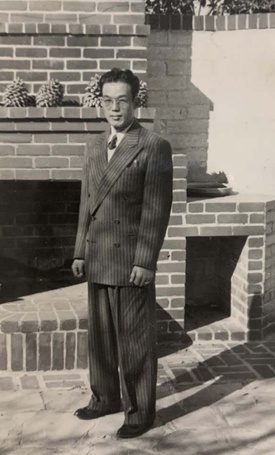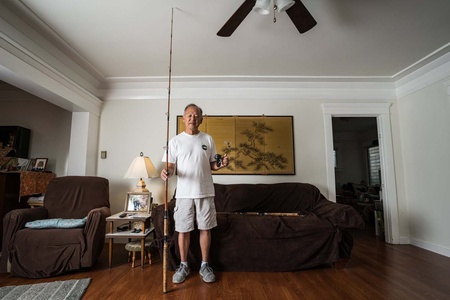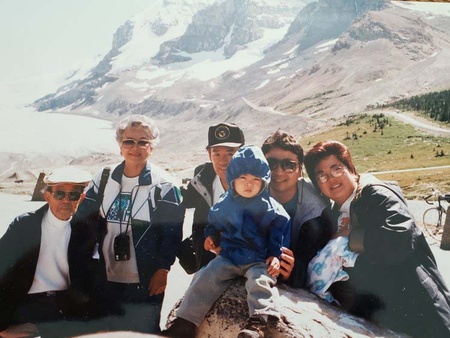When did your dad start sharing what happened in camp?
I would ask him every once in a while and he would tell me little things. He’d say, “You know the first week we were there we had to make our own meals. Nothing was set up yet so we had to eat outside. So one day we were all ready to eat, everything was all set and the food was cooked and everything, and this big dust storm came and just covered everything. We had to start all over again.” I [also] asked him about people going into the service, enlisting. He said, “Well, they wouldn’t take me because I had a medical deferment.” He said he was flat-footed.
How old were you when he started talking about it?
I think I was still going to trade school. He had a laundry service in Inglewood and we would go down to work with him. So one day while I was talking to him about camp he starts laughing and goes, “This is what happened, okay. I went to jail.” I said, “You went to jail?” He says, “The leader of JACL was preaching to everybody, all the guys, that you need to enlist in the service to show your alliance to the United States. And I said, ‘Why are you still here? If everybody else is supposed to enlist, why are you still here?’” So anyway, I guess him and his friends got together and said, “We’re going to teach this guy a lesson.”
They went to his house, got him out, and he said they’re going to break his leg or break his arm or something. So every time his arm hurt or his leg hurt he’ll think [about] why it’s hurting. What happened? And he would remember. So in the process, he’s [Kido] yelling and screaming and his wife comes out. She starts yelling and screaming, police show up and they were arrested. That’s what he said. Later on I found out he went to prison and I asked him how long he stayed in there. “Soon as the war was over, they let us go.”
When he finally told you, how did he tell the story? Was he open to sharing it?
Well, it was probably because I kept asking him things about the camp and the war and I think he got tired of making excuses. So far as I know he didn’t tell anybody else. He didn’t tell my brother or my two sisters. He told me ‘cause I was there with him alone at the laundry. “I got arrested, I was in jail.” I don’t think he would have enlisted anyway. They were against that, him and his friends.
Why was that his stance on the draft?
I don’t know. They gave you a choice to go back to Japan, so a couple of his brothers went back but I guess Dad and his other brothers didn’t have that opportunity or choice so they stayed in the United States. But you’ve given up everything that you have. You had a week to get ready to go to camp. You could only take what you could wear and what you could carry with two hands. Everything else gets left behind. The United States government is telling them, “You have to denounce Japan and pledge allegiance to the United States. On top of that, we want you to fight for us and go to war.” If I was my dad, I would’ve done the same thing. You’ve taken everything away from us, now you want us to fight for this stinkin’ country? No way.
So I think that’s what they were thinking. He never said it but I think most of them that ended up in jail were probably thinking the same thing: You make us give up everything we have, denounce Japan, and now you want us to go die for this country.
What did he end up doing for his life’s work?
He owned the Morningside Laundry in Inglewood. He had it for a long time. Maybe 20, 30 years. Every once in a while he’d say he wanted to run his own business and my father built it up to where it was really busy. He had a lot of regular customers.
Did he tell your mom what happened in camp?
Probably. I asked her and she goes, “Yeah I know. I know” [laughs]. But that was before they even knew each other so he must’ve told her or somebody told her. It was in the past. She didn't talk much about camp either.
When they received their apology and the redress check in the early ‘90s, do you remember their response to that?
Oh yeah, they were happy to get it ‘cause they were financially strapped. They were putting us in school and it was a real big help. Bachan was still alive, she got it. Mom got it, Dad got it.
Patty mentioned something interesting, which was that your dad would sometimes say offhandedly, “I’m no good.” No context for it but he’d just say it.
Well, Dad was a drinker. So he would get into his moods and stuff and you know, he would say things like that. But maybe it was the alcohol. He got really religious. They would have meetings here every week and they would have the reverends come here and they would have the services here. One of the closest reverends to our family, Reverend Unno would tell me, “Your Dad is a good man. He is something special.”
Do you know why he became so involved?
Well, one reverend told me that Dad was exploring different religions. I know when I’d usually come home on Sundays, he would be watching those services on TV, different services like Christian. And so he said that my dad was exploring different religions and Mom said that when they put us in Boy Scouts at the Buddhist temple, that’s when they started becoming a member there. He made some friends and I think since we were old enough, they put us in Sunday School. So Dad would have to take us to church and hang out with the other parents. Then he got to know the reverends and I don’t know why it started, but he started having services here on Saturday nights. That’s probably why I’m still involved in the temple.
Is there anything that you wish you had asked your parents about their experience?
Oh yeah. What was it like when you first got the notice? And what actually happened when you were interned? ‘Cause we never even spoke about it. And maybe talk to Dad a lot more. But maybe he didn’t want us to know what happened.
When I’ve read research and articles about the incident, they name your father as one of the ring leaders.
[laughs] Probably.
You’re not surprised about that. Do feel the point he was making was justified?
Oh yeah. I may have done the same thing.
But you know what’s funny? When Ronnie got his induction notice to go to Vietnam, he had to go. When he was getting sent back from Vietnam they told him, you stay another month and you’re done. Otherwise if you go back state side you have to do another six months. So Ronnie says, I don’t care, I’m getting out of this place. So he comes back, they let him come home for a few days [but] he had to report back to the military to Fort Lewis, Washington. And Ronnie says, “I’m done, I'm not going back.” Dad says, “You’re going back. I don’t want to hear anything else. Go finish your six months and come home. That’s your duty, we don’t want any trouble.”
Were you all equally close with your parents?
I think maybe Ronnie was the closest because he worked with him for a long time at the laundry. But because of his drinking problem, Kathie had a lot of resentment towards Dad, too.
Did his drinking affect you at all?
He didn’t get stone drunk, it’s just that he drank every night. After he got home from work he would drink. But the funny thing about it was he started having health problems and he told the doctor, “I could quit at any time.” He was a smoker, too. So one day he just says, “I’m done. I’m not going to smoke, not going to drink anymore.” But a month or so after that, he died in the doctor’s office.
What happened?
He was having chest pains or something, they couldn’t figure out what was wrong with him. He was going to UCLA and they couldn’t figure out what was wrong with him. One of his doctors finally got Dad approved for nuclear medicine testing at UCLA. He and Mom were excited that finally they would find out what was going on.
But Dad didn’t feel well the night before his appointment. The next day the doctor said, “Okay Mr. Matsuda, we’re going to run some tests and see what’s up.” So when Mom and Dad were leaving the office and got to the waiting room, Dad said he didn’t feel well. The doctor told Dad to come back in and he was doing to take his blood pressure. Dad said, “I have to use the restroom.” He never came out. They went to get him and the doctor’s knocking on the door. “Mr. Matsuda, are you okay?” Didn’t answer. He was against the door, laying on the floor. They were doing the chest compressions and everything, took him to the hospital and he passed away. As soon as I walked into the hospital the nurse comes in and says, “We worked on him for over an hour.”
How heartbreaking, he already passed.
Well, Dad says, “I want to just go like that, I don’t want to suffer or anything. And if I get cancer, don’t put me on chemo. I just want to go like that.” So he went the way he wanted.
At his service, was there a large turnout for him?
Oh, it was. ‘Cause he knew a lot of reverends and maybe there were a dozen reverends. The temple was standing room only, lined up outside the temple and everything. Everyone that attended was supposed to be at [my parents’] 50th wedding anniversary party but was now instead his funeral. He had a lot of friends.
*This article was originally published in Tessaku in November 15, 2021.
© 2021 Emiko Tsuchida









